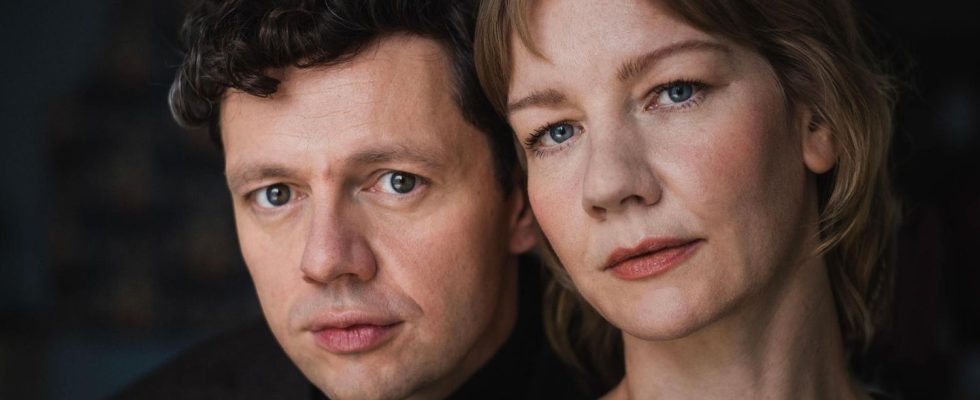Christian Friedel and Sandra Hülser play the Höß couple in the Auschwitz film “The Zone of Interest”. He is the commandant of the extermination camp, she gardens next to the crematorium. A conversation about the dangers of fascism – and the Oscars.
In “The Zone of Interest” you play the married couple Rudolf and Hedwig Höß, the commandant of the Auschwitz extermination camp and his wife. They are almost only shown in their house, right next to the camp. What is the appeal of portraying perpetrators so privately?
CHRISTIAN FRIEDEL: You always want to see these characters only as perpetrators, understand them only as perpetrators. As if they were all born Nazis. But they are people. It’s a hard sentence: people like you and me. Those who have made the decision to come to terms with the system.
SANDRA HÜLLER: To serve the system!
FRIEDEL: … to serve, to subordinate oneself. In order to thereby achieve a higher position. Like Höss. The director Jonathan Glazer wanted to observe these people so that we have to relate to them. I found that attractive.
Were you always aware that you were German in Auschwitz?
HÜLLER: Yes. We were the only Germans on the set in Auschwitz – that’s special anyway. I’m glad I did this with Christian. Because we trust each other. We talked to each other a lot, even during breaks and after work.
FRIEDEL: We have known each other for ten years. Back when we met while filming Amour Fou, we immediately had an energy together. Our familiarity was essential to being able to play this married couple. For my role of Rudolf Höß I had this Nazi haircut very early on. And so I went to the memorial exhibition as a private person. I put a hat on because I was so ashamed. Because it felt so wrong. I think that says it all.
Did you go to Auschwitz beforehand to prepare for filming?
FRIEDEL: Right. A great museum employee showed me everything there. She knew about our film. That’s why she did something she doesn’t normally do: she also spoke about the perpetrators. About Nazis who couldn’t cope with their work and suffered from psychological consequences. It was interesting that she opened up so much to show me this perspective. I wanted to understand how you have to feel to work there. It was very intense.
In addition to the watchtower and barbed wire, Hedwig and Rudolf Höß lived in this service villa
© picture alliance/dpa-Zentralbild
Ms. Hülser, you said that the biggest challenge wasn’t playing Hedwig Höß – but being in this place for so long.
HÜLLER: As a German, it is of course difficult to be there. But I think what happened in Auschwitz is part of humanity. That people allowed this crime to happen. Everyone should go there and think about where it can lead if you’re not careful. It starts with the language, that’s where exclusion begins. It was also noticeable that people were still walking around openly wearing swastika shirts. This is omnipresent. Nothing is being done about it either. A place to remember this catastrophe – at the same time there are people there who say I don’t give a shit. It coexists: horror and ignorance. We live in this time.
Sandra Hülser: “You don’t wake up in the morning and be a fascist”
The horror you mention is never actually shown in the film. You can only hear him. It wafts as sound from the neighboring camp into the garden of the family villa: shots, screams, blazing ovens. Why do we never see the horror?
HÜLLER: Ultimately there are two films. Film one with the images and film two with the sound. After the editing was done, they started the sound.
FRIEDEL: You can never depict horror in all its drasticness anyway. My first film role was in “The White Ribbon,” where there is a very brutal scene: a priest beats his children. But you only see one door – and hear the horror. The images that arise in your mind are very strong. Very intensive. Precisely because you can’t see anything. The same principle was chosen here: the mass murder can actually be perceived with all the senses – but we intensify by reducing. Our film is about omnipresent horror. The everyday horror. It’s about two people’s decision to live in their house right next to each other. I was in the house, I was standing in the children’s room, looking through the window. You see the gas chamber. You can’t say: I didn’t know that. It was a conscious decision. That smell, those sounds. You can almost smell it in our film – it conveys that. As a viewer, you’re constantly asking yourself: How do these people manage to ignore all of this? To live there? In my character you can see that the body reacts to the truth and there is a battle between body and soul. In my interpretation, it was about depicting vividly and making tangible how far people are capable of ignoring.
HÜLLER: This aspect also transports the film into the now. We not only think about the characters, but also compare ourselves: Where am I not looking? Where do I keep my mouth shut?
FRIEDEL: Ignorance is omnipresent. You just have to look around at what is happening in the world right now, including in our country; for example through the conflict in Israel.

